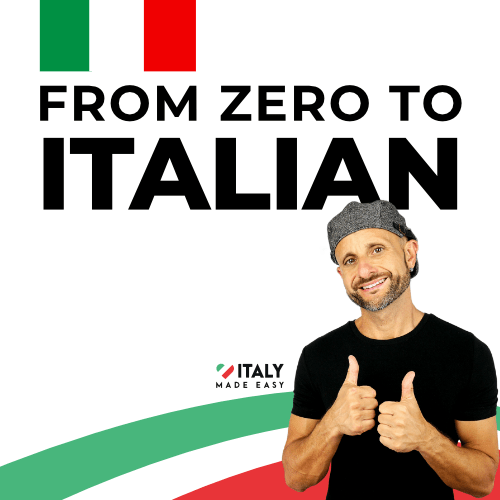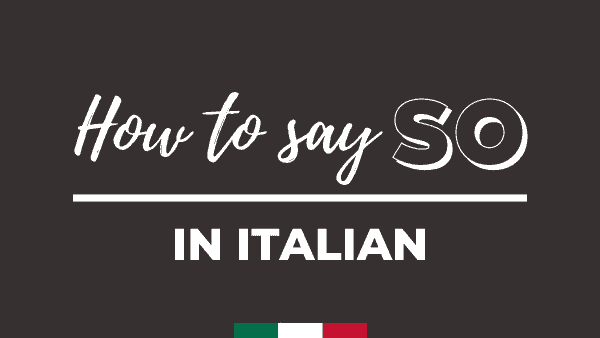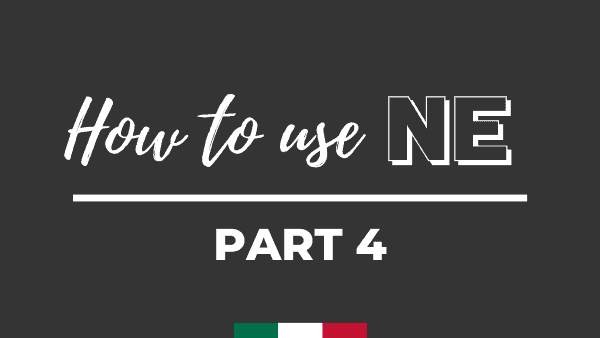The Particle NE
Lesson 1 of 4
The particle NE is a complicated beast. In the next 4 episodes of Ask Manu Italiano we'll try and demystify it and make some sense of it!
Download the PDF
No email required
Watch the PART 2 of the Lesson 1 HERE
You need to get good at this one!
Generally speaking NE works just like any other pronoun, that is, it replaces something that was mentioned before.
As a guideless, in most cases, the implied meaning of NE (which you might or might not translate into English) is:
- OF IT
- OF THIS
- OF THAT
- OF HIM (his)
- OF HER (hers)
- OF THEM (theirs)
or… more broadly…
- OF WHATEVER WAS MENTIONED
And NE usually replaces a QUANTITY.
▷ SOME EXAMPLES:
QUANTE MELE MANGI?
How many apples are you eating?
NE MANGIO TRE.
I eat three (of them, of the thing we are talking about)
QUANTI CAFFÈ BEVI?
How many coffees do you drink?
NE BEVO UNO.
I drink one (of them, of the coffees)
Learn Italian to Fluency
- The program you've been dreaming of is here
- Better than having a private tutor
- In-Depth Italian lessons for complete clarity
- Extensive pratice opportunities
- Access to our community - you are never alone!
- A true learning experience to Italian Fluency
HOW ABOUT THE DIRECT OBJECT PRONOUNS?
There is a huge difference between direct object pronouns and the particle NE. Direct object pronouns replace the actual OBJECT of a VERB.
You know you are dealing with the “object” if you can ask the question:
– WHAT?
– WHO?
Right after the verb of a sentence and the next word (the one you are wanting to replace) is the direct answer.
▷ AN EXAMPLE:
MANGI LE MELE?
Do you eat apples?
We could ask “WHAT?” right after MANGI and LE MELE would the grammatically correct answer.
That's a direct object, which we would replace with the appropriate Direct Object Pronoun. Not NE.
In this case the pronoun would be LE, which means “them” for feminine plural.
▷ SOME EXAMPLES:
MANGI LE MELE?
Do you eat apples?
SÌ, LE MANGIO.
Yes, I eat them.
CONOSCI MARIA?
Do you know Maria?
SÌ, LA CONOSCO.
Yes, I know her.
NE does not replace the direct object…
PRENDE UN CAFFÈ?
Would you like a coffee, sir/madam?
SÌ, NE VORREI DUE.
Yes, I would like two.
Here the question we need to ask for this to work grammatically is NOT “WHO/WHAT?” but rather:
– WHOSE?
– OF WHAT?
SÌ, NE VORREI DUE.
Yes, I would like two.
TWO of what? Ah, of the coffees!
It's not compulsory to use the NE… but you'll want to!
We are not forced to replace a known noun with a pronoun, right? I could say:
QUANTE MELE MANGI?
How many apples are you eating?
We could answer with:
MANGIO TRE MELE
I eat three apples
But why would we, when we can avoid having to repeat the word MELE!
These cases are the more complex ones…
POSSESSION
As a learner of Italian I really believe that you should have a solid grasp of NE when it replaces a quantity, which is the most common case and the one that you can master fairly quickly.
The following cases are a little more advanced and complex. I suggest you get an understanding of why Italians are using NE here so that you don't get lost when you hear it.
Take the sentence:
CONOSCO RITA E NE AMMIRO LA GENEROSITÀ
This is the same as saying:
CONOSCO RITA E AMMIRO LA SUA GENEROSITÀ
I know Rita and I admire her generosity
Italians will use the NE, just like in English we could use WHOSE:
I know Rita whose generosity I admire
That's because NE means “DI LEI” or “OF HER'S” “BELONGING TO HER” “HERS“
Or even more obscure…
join our italian community
- Access a ton of content on this website
- Weekly Digest with a ton of Italian lessons, videos & facts!
- Invitation to Live Q&A Lessons with Manu
- Invitation to exclusive Webinars, Live Lessons & Games
- Coupons, Discounts & Specials for our Premium Italian Courses
THE THING THAT WE ARE TALKING ABOUT
The sentence:
IERI HO AVUTO UN PROBLEMA A LAVORO E NE HO SUBITO PARLATO CON VALERIO
Yesterday I had a problem at work and I immediately talked about it with Valerio.
Why NE?
Because NE means “ABOUT IT” , “OF IT“
Are you seeing a pattern here?
One more.
SONO ANDATO IN UFFICIO ALLE 9 E NE SONO USCITO SOLO ORA!
I went to the office at 9 and I only got out of it now!
NE means…. drum roll… “OF IT“.
Or really cool…
REPLACING A WHOLE SENTENCE
HAI VOGLIA DI ANDARE AL CINEMA?
Do you feel like going to the cinema?
Literally “do you have want of going to the cinema?“
NO, NON NE HO VOGLIA.
Now, I don't feel like it.
Literally “No, I do not have the want for it“
Why NE? Because we are saying:
NO, NON HO VOGLIA (DI ANDARE AL CINEMA)
No, I don't have the desire (of going to the cinema)
Seen the pattern yet?
A few more sentences before giving you the magic potion of knowledge…
VUOI UN CAFFE?
Do you want a coffee?
NE VOGLIO DUE!
I want two (of them)
QUANTI FIGLI HAI?
How many children do you have?
NE HO UNO.
I have one (of them)
È DA MOLTO TEMPO CHE NON VEDO LUCIA. NON NE SO NIENTE.
It's been a long time since I've seen Lucia. I know nothing about/of her.
Turn the page for the magic potion.
You will use NE whenever your sentence would imply: OF SOMETHING.
In other words, if the thing you are replacing needs to be introduced by a “DI” (“OF“), chances are you will need to replace it with NE.
Go over all the examples in this PDF to see the pattern!
Watch the PART 2 of the Lesson 1 HERE
Download the PDF
No email required



